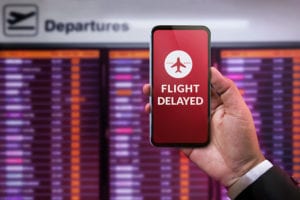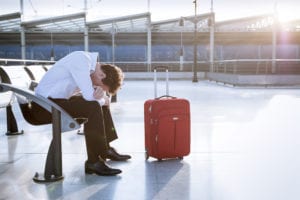Air travel – What could possibly go wrong?
Well, not a lot really:
In 2015 37.5 million flights took to the skies, 68 of these flights had accidents and a total of 4 of these flights had accidents that involved fatalities. So if dying on a commercial flight is your dream way to go, you would have to undertake 25,667 flight per day for a year to be in with a chance. Sorry to be the bearer of bad news on that one.
So what really is the worst thing to happen when travelling by air?

Ekaterina Pokrovsky/Shutterstock
Picture this, for months you and your family have planned for the perfect holiday. Finally, the game day has arrived, and you have all packed your flip flops, trunks, and snorkel gear, with passports in hand and tickets at the ready, you finally reach the departing airport and approach the check-in desk. Ready to start your adventure, and glee in your eyes your excitement slowly turns to dread as your flight number is solemnly followed by the flashing red words of disappointment… Delayed or even worse cancelled. Some of you may also be unlucky or (lucky enough depending on how urgent your flight is) to get to the front of the check-in line only to be told,
‘I’m sorry we appear to have over-booked your flight and there are no longer any seats available for you and your family, but don’t worry, for free of charge we have booked you onto the next flight that departs first thing in the morning.’
The above scenarios are pretty rare and if you are delayed the likelihood is that it will be under an hour. However if you are denied boarding, delayed for a lengthy amount of time or the flight is cancelled, here is a little guide to the rules and what you are entitled to which hopefully will make the event as stress-free as possible.
What is Regulation (EC) No 261/2004?
Regulation (EC) No 261/2004 was created in 2004 with the purpose of ensuring a high level of protection for passengers in the field of Air Transport. A lot of focus around this regulation has been publicised as a way for consumers to be compensated for their disruption to travel plans. However, the same regulation not only gives you the right to compensation but also the duty to provide immediate care, if a disruption occurs. The airlines won’t tell you this so it is worth taking a note.
What is Denied Boarding?
Denied boarding as shown in the example above is defined within the regulation as ‘refusal to carry passengers on a flight, although they have paid for the flight and presented themselves for boarding’.
If the airline expects that they will need to deny boarding onto a flight (for overbooking) they should first ask for volunteers to come forward to give up their seat, if none or not enough volunteers come forward then the airline can choose to deny individuals even against their will.
Volunteer or risk being chosen when Denied Boarding?
Volunteers are able to surrender their seats in exchange for benefits, which need to be agreed between the individual and the airline (to ensure a valid contract has taken place). So what are these benefits? Well, anything you want to ask for (although keep it reasonable). If they don’t make a sensible offer and you subsequently refuse you longer count as a volunteer, so be bold. If you do come to an agreement you will also be given the option of reimbursement of the full cost of the flight or a rescheduled flight so don’t forget this when discussing your benefits.
If you are denied boarding against your will you are automatically entitled to compensation, as long as you are not denied boarding for a valid reason, for example, health issues, because you pose a security risk or because you have forgotten vital documentation such as your Passport or a Visa where applicable etc. The levels of compensation are covered below:
As well as compensation you will be entitled to meals and refreshments if the waiting time is beyond reasonable. If it runs overnight or longer you are entitled to Hotel accommodation as well as transport to and from the hotel. In addition to this you also ‘will be offered two free telephone calls, telex or fax messages, or e-mail access’ according to the regulations. If the airline refuses to place you in a hotel or provide food and drink (many staff don’t know or choose to ignore the rules) you can pay for these yourself and make a claim once you get home. If you are forced down this route ensure you keep all receipts if you are wanting to claim this back. Also note that these costs also need to be reasonable, so don’t book yourself into a 5-star hotel, or order the lobster with a side of prosecco then raid the minibar and expect full reimbursement.
What is a Flight delay?

Black Salmon/Shutterstock
If your flight is delayed again you have the right to refreshments and meals, and a hotel, if the delay is long enough. However, your right to care is based on the length of delay and the distance you are scheduled to travel. These are itemised below:
Meals and refreshments
(a) for two hours or more in the case of flights of 1500 Kilometers or less; or
(b) for three hours or more in the case of all intra-Community flights – defined as “The movement of an aircraft between two EU airports, without any stopovers, which does not start from or end at a non-EU airport.” of more than 1500 Kilometres and of all other flights between 1500 and 3500 Kilometres; or
(c) for four hours or more in the case of all flights not falling under (a) or (b),
Hotel Accommodation
(d) if the delay is expected to last into the day after the scheduled time of departure irrelevant of the distance.
Reimbursement of the ticket
(e) When the delay is at least five hours irrelevant of the distance.
Financial Compensation
When the delay is at least 3 hours you will also be entitled to compensation depending on why the flight was cancelled, this is shown in more detail further down.
What is a Flight Cancellation?

NicoElNino/Shutterstock
Basically for cancellations, your entitlements are pretty much the same as for a delay as identified above, however, there are some points to note regarding flights cancelled long before your scheduled departure date.
The regulation states that you are entitled to compensation unless;
(i) You were informed of the cancellation at least two weeks before the scheduled time of departure; or
(ii) informed of the cancellation between two weeks and seven days before the scheduled time of departure and offered re-routing, allowing you to depart no more than two hours before the scheduled time of departure and to reach your final destination less than four hours after the scheduled time of arrival; or
(iii) you are informed of the cancellation less than seven days before the scheduled time of departure and are offered re-routing, allowing you to depart no more than one hour before the scheduled time of departure and to reach your final destination less than two hours after the scheduled time of arrival.
So essentially if you are informed of the cancellation more than 2 weeks before you are due to fly you are not entitled to compensation.
If you find yourself at a loss because the airline says you have been informed of the cancellation but you do not believe this is the case, the burden of proof lies with the airline, as in they must prove that you were notified about the cancellation. This could be direct to you or through the travel agent that you have booked the flights with. If you haven’t been informed then compensation will be deemed applicable.
If the cancellation messes with your travel plans such as a business trip, you are entitled to either reimbursement or re-routing so if you know that the cancellation is going to cause you to miss the purpose of your journey you can request a refund of the ticket price and look elsewhere.
How much compensation do you get for a flight delay?
The compensation element under the regulation is complicated and separated into 4 levels, €250, €300, €400 and €600, all on a per passenger basis. As a guide, you can expect:
– €250 for all passengers who are delayed over 3 hours and their flight is 1500 kilometres or less (short-haul flights)
– €300 for all flights over 3500 kilometres that are not from one EU country to another and the disruption is more than three hours but less than 4. (long haul flights)
– €400 for all intra-Community flights of more than 1500 kilometres, and for all other flights between 1500 and 3500 kilometres (Medium haul flights)
– €600 for all flights over 3500 kilometres that are not from one EU country to another (long haul flights).
If you have to make a claim it is worth quantifying it with a Solicitor who deals with this type of claim.
Can anyone make a flight delay compensation claim?
The short answer is no, Under the Regulation EC 261/2004, to be applicable for the compensation you must fit into the scope of the regulation.
The scope says that you must fit into the following criteria to be covered by the regulation.
1. The passenger must be departing from a from an airport located within the territory of a member state covered by the regulation. Or;
2. The passenger must be departing from an airport outside of the territory and flying with a community carrier.
3. The passenger must have a confirmed reservation on the flight.
4. The passenger must have presented themselves for Check-in when stipulated by the airline. If no check-in time specified by the airline, then the passenger must check-in 45 minutes before the scheduled time of departure.
5. If the passenger has travelled free of charge, then they will not be covered by the regulation unless they have travelled free of charge by utilising their rewards from a frequent flyer programme.
6. If the passenger has travelled at a reduced price that is not available directly or indirectly to the public, such as airline staff discounts, the regulation for delayed flight compensation will not apply.
7. The passenger must by travelling by motorised fixed-wing aircraft.
As long as you fit these categories, you will be covered by the regulation. However, this does not mean that you will be entitled to delayed flight compensation.
When does an airline not have to pay compensation?
If you fit into the points above the airline does not have to pay compensation if they deem the disruption was due to an extraordinary circumstance, one that could not have been avoided if all reasonable measures had been taken. This is where the disputes lie as the definition is to a degree open to interpretation. For an event to be classed as an extraordinary circumstance, the event must not be inherent in the daily activities of the airline or be considered as normal airport services.
So if your flight is delayed due to an ‘air traffic control strike’ compensation would not be applicable unless the airline had an opportunity to avoid the disruption but failed to do so due to their error.
Virtually all airlines will try to deny compensation if they have any chance, so if you feel on the day that they have not done enough to avoid the disruption, makes notes of the events and the times, as this can be valuable evidence if you wanted to argue the points later on. This is also important if you need to claim for Hotel Accommodation and or Refreshments.
Remember, irrespective of whether compensation is applicable you are always entitled to refreshments and hotels if applicable.
Want to speak to a solicitor about your flight delay case?
If you would like to speak to one of our Panel Solicitors about Flight delay claims please use the form below